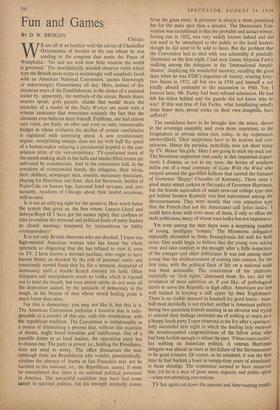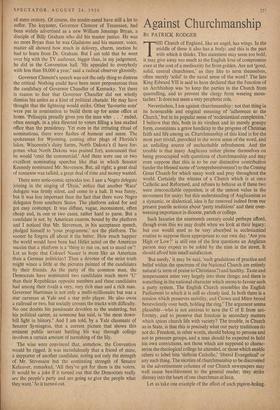BY D. W. BROGAN Chicago W E are all of us
familiar with the advice of Chancellor Oxienstierna of Sweden to the son whom he was sending to the congress that made the Peace of Westphalia : 'Go and see with how little wisdom the world is governed.' The moralistically minded observer (with which type the British press corps is surprisingly well supplied), faced with an American National Convention, quotes (knowingly or unknowingly) Oxienstierna all day. Here, instead of the decorous ways of the Establishment, is the choice of a national leader by, apparently, the methods of the circus. Bands blare; orators spout; girls parade; claims that would strain the credulity of a reader of the Daily Worker are made with a solemn assurance that sometimes conceals the fact that the claimant even believes them himself. Emblems, one had almost said relics, arc freely on offer and even on sale; innumerable badges in whose evolution the decline of certain candidacies is registered with surprising speed. A new revolutionary regime. overprinting stamps, does not act with half the speed of a button-maker reducing a presidential hopeful to the con- solation prize of the vice-presidency. TV-conducted tours of the epoch-making deals in the halls and smoke-filled rooms are enlivened by commercials. And in the convention hall, in the corridors of overcrowded hotels, the delegates, their wives, their children, newspaper men, tourists, mercenary musicians, playing for Harriman one hour, then for Stevenson, bottles of Pepsi-Cola on human legs. harassed hotel servants, and, pre- sumably, residents of Chicago about their lawful occasions, mill around.
It is not an edifying sight for the sensitive. ,How much better the system that gives us, the free voters, Lennox-Lloyd and Selwyn-Boyd (if I have got the names right), that confines or tries to confine the personal and political feuds of party leaders to closed meetings tempered by indiscretions to lobby correspondents!
It is not only British observers who are shocked. I know one high-minded American woman who has found the whole spectacle so disgusting that she has refused to view it, even on TV. I have known a devoted partisan, who ought to have known better, so shocked by the role of personal vanity and tenaciously nursed feuds that he, for a moment, despaired of democracy until a double Scotch restored his faith. Other delegates and manipulators resort to vodka which is reputed not to taint the breath, but even ardent spirits do not undo all the depression caused, by the spectacle of democracy in the rough, in the breasts of men whose moral boiling point is much lower than mine.
For this is democracy; you may not like it, but this is it. The American Convention performs a function that is indis- pensable in a country of this size, with this constitution, with the republican tradition. The Convention is indispensable as a means of dramatising a process that, without this injection of drama, might breed boredom and indifference. Out of a possible dozen or so local leaders, the opposition party has to choose one. The party in power, i.e., holding the Presidency, does not need to worry. The office dramatises the man (although there are Republicans who wonder, pessimistically; whether the absence of drama at San Francisco may not be harmful to the national. i.e., the Republican. cause). It must be remembered that there is no national political personnel in America. The successful candidate may have had some career in national politics, but his strength normally comes from the grass roots. A governor is always a more promising bet for the main spot than a senator. The Democratic Con- vention was exceptional in that the probable and actual winner, having run in 1952, was very widely known indeed and did not need to be introduced to the public or the local leaders, though he did need to be sold to them. But the problem that the Convention had to deal with was admirably if painfully illustrated on the first night. I had seen James Aloysius Farley walking among the delegates in the 'International Amphi- theater,' displaying his wonderful memory, recalling the great days when he was FDR's organiser of victory, winning forty- two States in 1932, all but two in 1936 and himself a not totally absurd pretender to the succession in 1940. Yet, I learned later, Mr. Farley had been refused admission. He had left his ticket behind and the guards did not know who he was! If this was true of Jim Farley, what humiliating rebuffs must lesser men, proud cocks on their own dunghills, have suffered !
The candidates have to be brought into the arena, shown to the sovereign assembly and, even more important, to the kingmakers in private suites (not, today, in my experience. smoke-filled). Their supporters have to be zealous and con- ' spicuous. Hence the parades, mercifully now cut short today by TV. Hence 'les girls.' Here I am going to stick my neck 'out. The,Stevensop supporters won easily in this important depart- ment. I dismiss, as not to my taste, the bevies of southern belles out of a road company of Gone With the Wind who swayed around the gas-filled balloon that carried the fortunes of Governor 'Happy' Chandler of Kentucky. There were a good many smart cookies in the ranks of Governor Harriman, but the female equivalent of smart crew-cut college type that got behind Senator Kennedy was best represented among the Stevensonazons. They were mostly that very attractive type that the French (but not the Americans) call 'jolies !aides.' 1 could have done with even more of them, if only to offset the male politicians, many of whom were bulky but not impressive.
Yet even among the men there were a surprising number, of young, intelligent 'comers.' The Minnesota delegation especially abounded in them. Pennsylvania did well for both sexes. One could begin to believe that .the young were taking over, and take comfort in the thought after a little inspection of the younger and older politicians. It was just among these young that the disillusionment of coming into contact; for the first time, with the political facts of life on a national scale was most noticeable. The evasiveness of the platform, especially on 'civil rights,' distressed them. So, too, did the revelation of mere ambition or, if you like, of pathological desire to serve the Republic in high office. Americans are less well trained in keeping a stiff upper lip than Englishmen. There is no visible demand in baseball for good losers: base- ball most decidedly is not cricket; neither is American politics. Seeing two quondam friends meeting in an elevator and trying to conceal their feelings reminded me of nothing so much as a a happy lunch party I once observed at the Ivy after a spectacu- larly successful first night in which the leading lady received the aconite-soaked congratulations of the fellow artist who had been foolish enough to refuse the part. 'Venus route entiere' has nothing on American politics. A veteran Harriman delegate was almost in tears at the.failure of the Stevensonians to be good winners. Of course, as he admitted, it was the first time he had backed a loser in twenty-four years of attendance at these shindigs. The experience seemed to have unnerved him, yet he is a man of great sense, sagacity and public spirit —when not attending conventions. of mere oratory. Of course, the tender-eared have still a lot to suffer. The keynoter, Governor Clement of Tennessee, had been widely advertised as a new William Jennings Bryan, a disciple of Billy Graham who did his master justice. He was no more Bryan than he was Gladstone and his manner, voice, matter all showed how much in delivery, charm, unction he had to learn from Dr. Graham. But I am told that he went over big with the TV audience, bigger than, in my judgement, he did in the Convention hall. 'He appealed to everybody with less than $8,000 a year,' said a radical observer gloomily.
Governor Clement's speech was not the only thing to distress the.critical. Nothing could have been more preposterous than the candidacy of Governor Chandler of Kentucky. Yet there is reason to fear that Governor Chandler did not wholly dismiss his antics as a kind of political charade. He may have thought that the lightning would strike. Other 'favourite sons' were put in nomination to build them up for some office at home. 'Pelissipia proudly gives you the man who . . .' ended, often enough, in a plea directed to voters filling a less exalted office than the presidency. Yet even in the irritating ritual of nominations, there were flashes of humour and sense. The spokesman for Wyoming, coining after plugs of Florida's lakes, Wisconsin's dairy farms, North Dakota's (I have for- gotten what North Dakota was praised for), announced that he would 'omit the commercial.' And there were one or two excellent nominating speeches like that in which Senator Kennedy nominated Mr. Stevenson. But, all right; a great deal of nonsense was talked, a great deal of time and money wasted.
There were serio-comic episodes too. I saw a Negro delegate joining in the singing of 'Dixie,' notice that another 'Race' delegate was firmly silent, and come to a halt. It was funny, but it was less important than the fact that there were Negro delegates from southern States. The platform asked for and got easy contempt. It was diffuse, vague, inconsistent, often cheap and, in. one or two cases, rather hard to parse. But a candidate is not, by American custom, bound by the platform and I noticed that Mr. Stevenson, in his acceptance speech, pledged himself to 'your programme.' not the platform. The sooner he forgets all about it the better. How much happier the world would have been had Hitler acted on the American maxim that a platform is a 'thing to run on, not to stand on'! Let us hope that Colonel Nasser is more like an American than a German politician! Then a devotee of the strict truth might wince a little at the pictures painted of the candidates by their friends. As the party of the common man, the Democrats have nominated two candidates much more 'U' than their Republican opposite numbers and these candidates had among their rivals a very, very rich man and a rich man. Governor Harriman is not only a multi-millionaire but was a star oarsman at Yale and a star polo player. He also owns a railroad or two, but socially crosses the tracks with difficulty. No one doubts his passionate devotion to the underdog, but hi,s political career, as someone has said, is 'the most down- hill fight in history.' And I am told, by a Yale classmate of Senator Symington, that a current picture that shows this eminent public servant battling his way through college involves a certain amount of tarnishing of the lily.
The wise were convinced that, somehow, the Convention would be rigged. It was incredulously that a friend of mine, a supporter of another candidate, noting not only the strength of Mr. Stevenson but the continuing strength of Senator Kefauver, remarked, 'All they've 'got for them is the voters. It would be a joke if it turned out that the Democrats really are the people's party and are going to give the people what they want.' So it turned out.



























 Previous page
Previous page